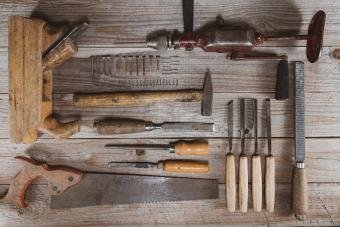
An antique auction is an opportunity to offer an item for bidding or to purchase an item through bidding. Held both in person and online, these types of auctions are particularly popular for antiques and collectibles where the value of a piece can fluctuate dramatically based on its popularity and buyer demand.
How Do Antique Auctions Work?
When it comes to auctions, a seller can either auction items directly or consign them to an auction house. An auction house provides more services, including valuation; advertising or marketing, including a catalog; and managing the actual bidding, payment process, and delivery; and has a pre-existing reputation and body of bidders. However, these services cost more than direct auctions through charging premiums to sellers and buyers. Online auctions like eBay provide the auction platform and body of bidders and so charge lower premiums. However, the seller is still responsible for handing the transaction and is at risk for buyer's fraud, and the items don't have the protection of professional valuation.
Seller Premiums at Auctions
Seller premiums, the amount the seller pays to have an item auctioned, usually start at some minimum amount and are set at a certain percentage of the final price. Typically, the higher the price of the item is set, the lower the percent premium. Buyer premiums are also a percentage of the final price.
Reserves at Auctions
Because the price bidders are willing to pay may be considerably less than the price that the seller would like to accept, sellers can set reserve, a minimum final price. If the highest bid the item receives is not equal or greater to the reserve, the item does not sell. The seller typically still pays the auction house or online auction platform some kind of listing fee.
Auction Previews
In-person auctions usually have preview periods, during which potential bidders are able to inspect the items and ask the auction house representatives some questions. These are usually held during the two or three days before an auction. Items are rarely available for hands-on inspection during the auction. Attending previews is free and does not oblige you to bid.
The Bidding Process
Bidding requires registration and, in some cases, usually for very high-end auctions, proof of the ability to pay, such as a certified check or a bank statement. Contrary to movie wisdom, you can't bid inadvertently in a live auction by nodding or blinking; you usually have to raise a paddle with your assigned identification number.
Kinds of Auctions

Interestingly, there isn't a single way to hold an auction; rather, there are multiple different styles of auctions that you might participate in. Depending on which style of auction you visit, you may have to follow a different bidding process than at others. Here are a few popular auction styles.
English Auction
The most common kind of antique auction is the English auction, in which the item begins at a price usually lower than the estimated final price, and the auctioneer (or software) increases the price by set intervals. Bidders indicate their willingness to pay each subsequent price until there are no higher bids and the last bidder is the winner. This bidding process is transparent; each bidder knows what the most recent bid is.
Silent Auction
In this kind of auction, each bidder submits one bid without knowing how much other bidders are offering. The highest bidder wins. Here, bidders must make very astute predictions of how much others are willing to pay and bid just enough above that amount to win, but not so much that they overpay for something they could have won more cheaply.
Dutch Auction
This auction is the reverse of the English auction. Bidding starts at a price well above the estimated value and the auctioneer lowers the bid by selected increments. The first person to accept the offered bid wins the item. Like silent auctions, this requires the bidder to anticipate the price others would offer and make an offer just before that moment.
Where to Find Antique Auctions
With the modern digital age, there's an abundance of places to go to, either in-person or online, to auction off antiques at. That being said, not every auction house or website is as easy to navigate or exclusive as some, so it's best that you familiarize yourself with the different ones available so that you can pick the best auctions for the types of antiques you're looking to buy or sell.
Live Auctions
Typically, live auctions fall into two categories: local and renowned. Local auctions are usually estate sale-based and don't often sell huge ticket items, and you can find these auction businesses across the United States. In contrast, the renowned high-end auction houses that most people hear about are highly exclusive and almost always sell items with a minimum valuation. Here are a few of these renowned auction houses:
- Sotheby's - Sotheby's is an American auction conglomerate with satellite offices around the globe, and they specialize in fine art, jewelry, and collectibles. They're considered the premiere auction house for most antiques, and therefore, have record breaking sales all the time.
- Christie's - Sotheby's direct competitor is Christie's, a British auction house that sells the same type of fine art, jewelry, and collectibles that Sotheby's does.
- Bonhams - Bonhams is one of the world's oldest auction houses, having started in 1793. According to their website, they specialize in motor cars, jewelry, and fine art.
- Fontaine's Auction Gallery - Fontaine's is a newer American auction house based in New England that sells a variety of fine art and antiques.
Online Auctions
By and large, most people today buy and sell their antiques online, since it's a more streamlined process and somewhat cheaper than conventional auction houses. Similarly, you can sell items that high-end auction houses aren't interested in selling since they're low in demand or not worth a high profit. Here are the top online auction websites right now:
- eBay - The cream of the online auction crop is eBay. This website (probably) has millions of sellers all offering their goods for a variety of prices. If you can't find it on eBay, then there's a good chance that it just isn't out there.
- Heritage Auctions - Heritage Auctions is an auction house with an online platform that specializes in antique and vintage goods, often offering uncommon collectibles like comic books and music and sports memorabilia.
- Live Auctioneers - Live Auctioneers is an auction website that partners with smaller auction houses to host their listings and sales. You can find both expensive and common antiques and vintage items here.
- 1st Dibs - 1st Dibs is an interesting auction platform that tries to be the high-end auction house of the online auction world. Typically, they cater to the conventional antiques market, offering items like furniture, fine art, jewelry, and more.
The Pitfalls and Frustrations of Buying at Auctions

There are several potential pitfalls, especially for buyers, in antique auctions, and these are just a few of them.
Going Over Budget
First, it's very easy to get caught up in the excitement of bidding, or become determined not to let another person have the item that you've fallen in love with and bid more than you expected or even more than the item is worth. The best way to prevent this is to set an amount and stick to it. If necessary, bring along a companion who will keep you to your budget. Keep in mind that the final bid is not the final price, as you'll have to pay the buyer's premium and possibly sales tax on top of that.
It can be very difficult to make decisions about your budget if there's more than one item that you'd like to purchase, since you don't know the real price of any of them until the bidding is over. If you don't bid on the first piece you'd like in the hopes of winning the second piece, you can walk away with nothing if the second piece goes too high for your budget, and this is especially frustrating if the first piece went at a bid lower than you would have paid. Similarly, you can bust your budget on the first piece and miss a bargain later.
Trusting the Auction House to Honor Your Absentee Bid
If you can't attend a live antique auction (or don't trust yourself during live bidding) you can leave an absentee bid in which you state the top amount you'd pay and authorize the house to bid on your behalf. However, you do have to trust the auction house not to set your own bid against you; if your top price is $100 and the last bid they receive is $50, they do financially better if they put in your top bid at $100.
Potentially Buying a Reproduction or Fake
Auction buyers are still vulnerable to buying reproductions as originals. An auction house's description of an antique provides some guarantee under certain conditions. Be sure to read the fine print about descriptions and what terms mean as well as the conditions of the guarantee.
You Better Place Your Bid Before Everything Goes
Going to an auction can be a thrilling adventure, and fighting to have your bid be the winning one can take you on an emotional rollercoaster. That being said, auctions are one of the best ways to find specific and valuable antiques, so if you're thinking about building a great collection or getting into the business, then you've got to get comfortable with the ins and outs of the different antique auctions out there.







